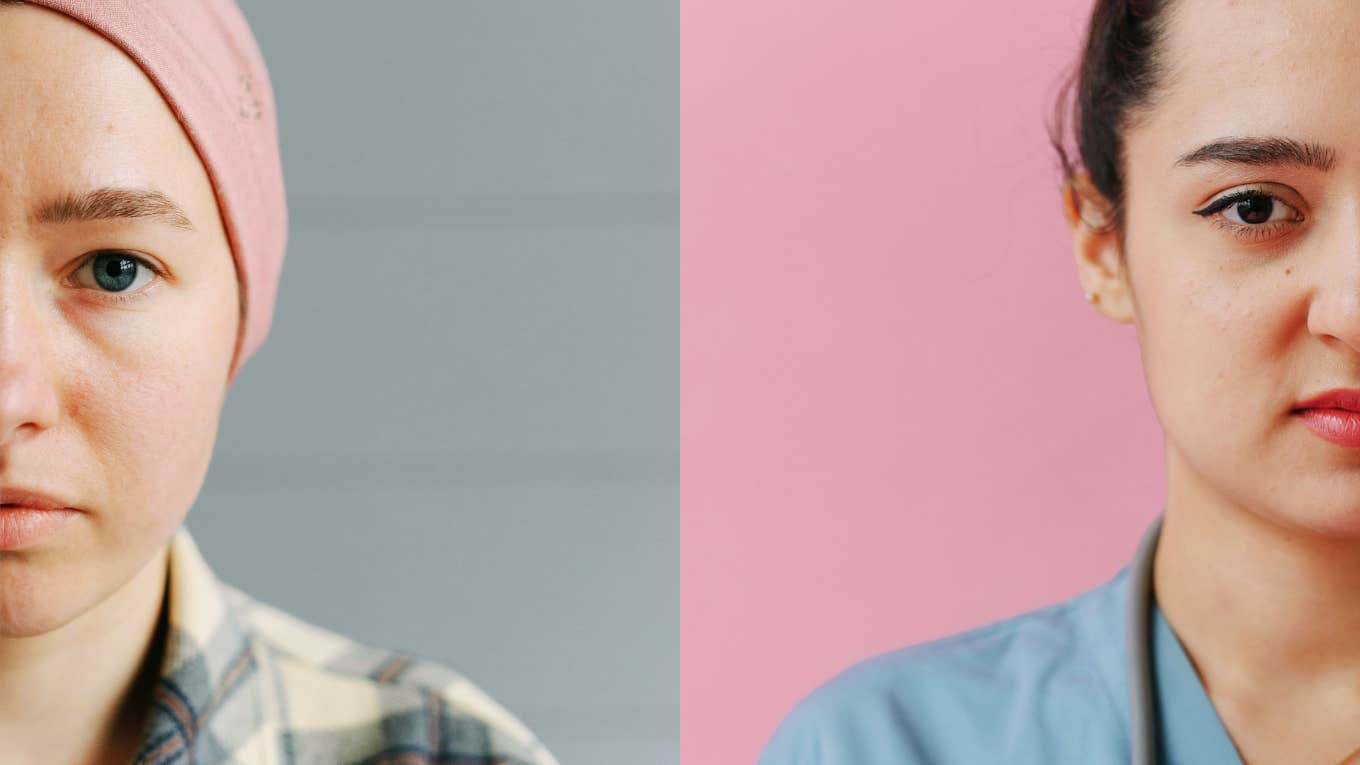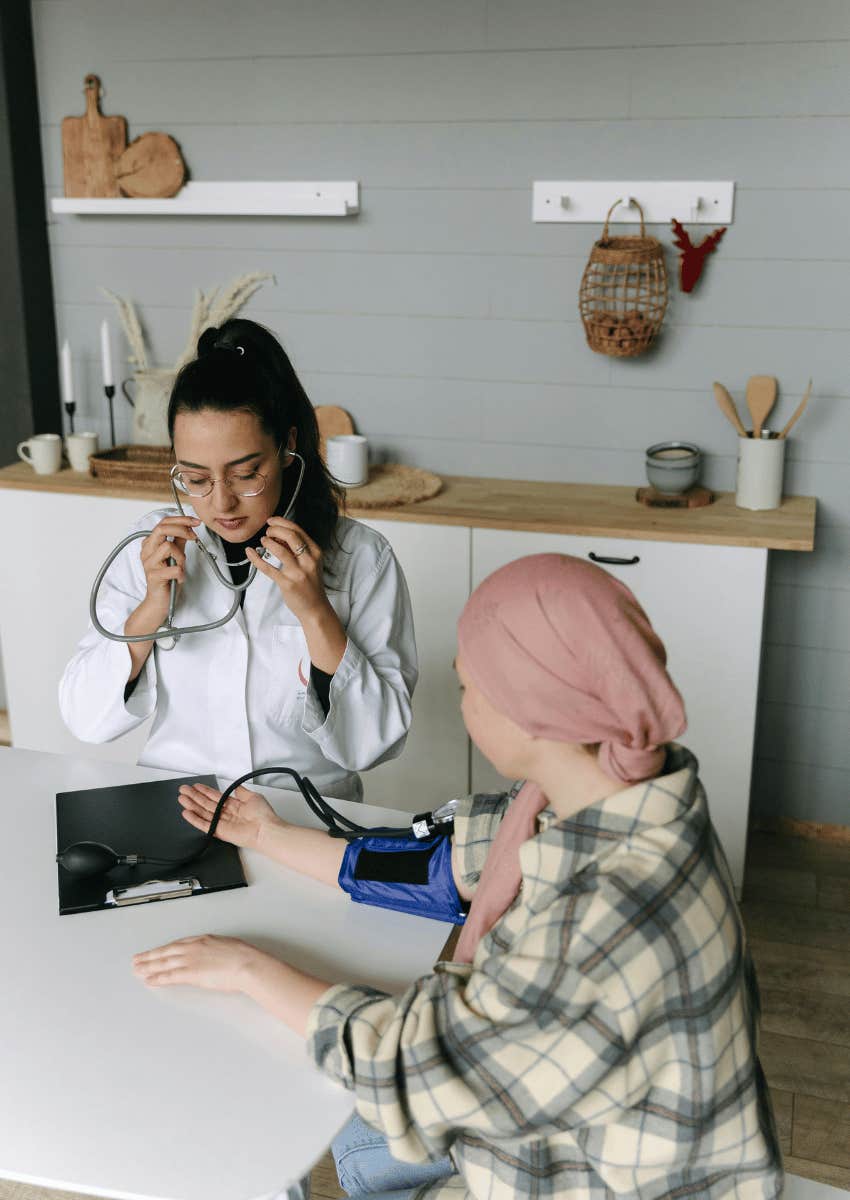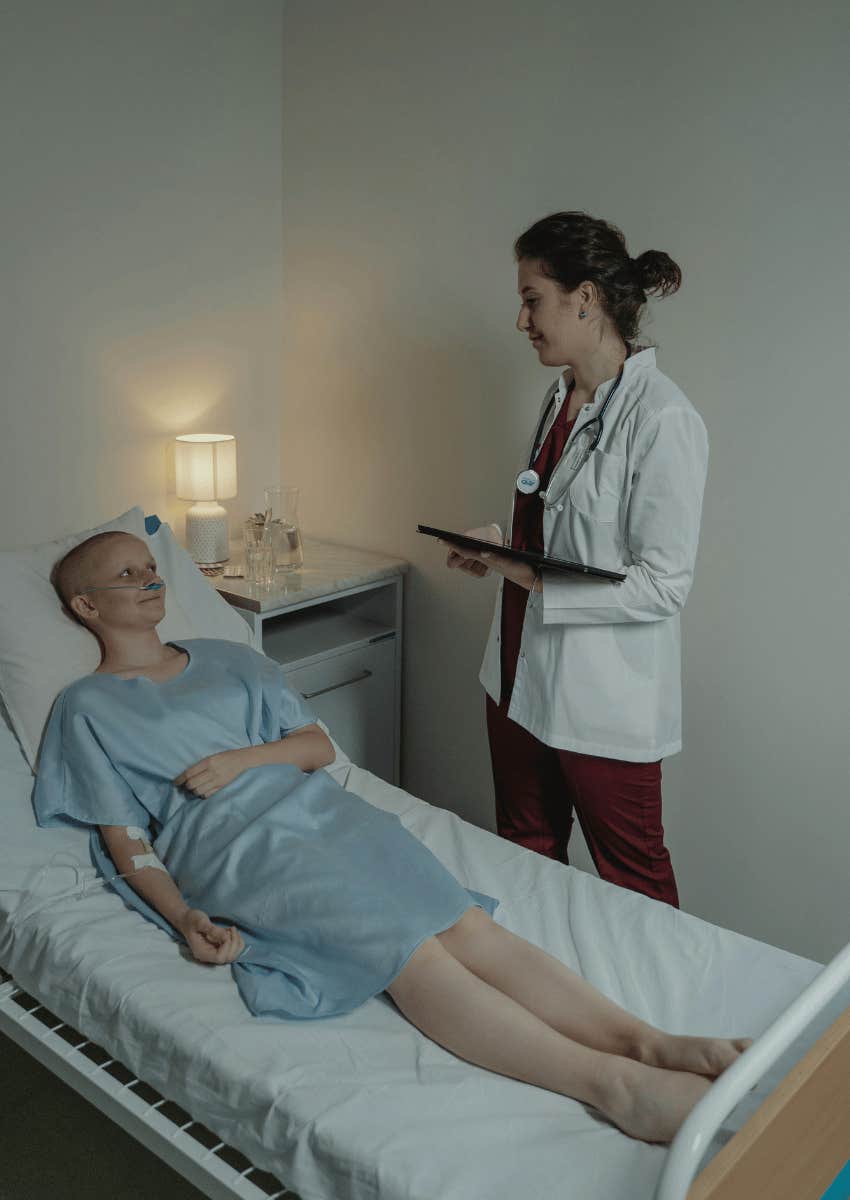I'm An Oncologist And A Breast Cancer Patient Taught Me Something Nobody Else Could
I overlooked one of the most important aspects of examining a female patient: breast examination.
 cottonbro studio, Thirdman | Pexels
cottonbro studio, Thirdman | Pexels It was my first week in the oncology department as a resident. The day had been busy, and most of the consultants and staff had already left the clinic. was exhausted and hungry, with thoughts of dinner dominating my mind.
Just as I was finishing up, the physician assistant (PA) rushed in and informed the attending that a patient from a nearby hospital needed immediate consultation. My mood deteriorated, and all I could think about was food. As a new oncology resident, I was unprepared for emergencies and the consequences of ignoring a cancer patient in need. This news deeply frustrated me.
As if working extremely long hours wasn’t exhausting enough, the entire day, combined with the grumbling sounds from my stomach, made me uncomfortable. I was already tired from working nonstop in that stressful environment without a lunch or bathroom break, and the prospect of spending another half hour on an empty stomach made me more frustrated. However, I did my best to remain composed.
In moments like these, as a doctor, remembering the Hippocratic Oath has always saved me.
I remembered how I promised myself that I would prioritize my patients and make them feel truly cared for by me. Moments later, attendants brought in a young woman on a stretcher. She looked to be in her early thirties, frail, and in agonizing pain. I would tell you exactly how I felt at that moment. I was afraid because I was a new doctor who had never worked with cancer patients.
My mind went blank when I saw such a young lady in agonizing pain. She was drowsy and looked pale. Her lips were dry, and she appeared dehydrated. The nurse who took her vitals informed me that her blood pressure was low and her pulse rate was unusually fast.
The worst part was that I had no idea how to console a patient who was in unbearable pain. Her attendants informed me that she had been unable to eat for the past two days because she had been vomiting all day, most likely due to pain.
I hastily took her medical history. She was a mother of three, a homemaker, hailing from a lower-middle-class background, and a non-smoker with no family history of carcinoma.
The only medical document in her possession was an MRI spine report, revealing multiple lesions in her thoracic and lumbar vertebrae. On examination, she was paraplegic (paralysis that affected her legs but not her arms in terms of movement) with a 1/5 power rating in both lower limbs.
As I examined her, the attending physician interrupted and asked, “Have you examined her breasts?” Regrettably, I had not.
I felt ashamed because I performed a thorough neurological and general physical examination on the patient but overlooked one of the most important aspects of examining a female patient: breast examination.
 Thirdman | Pexels
Thirdman | Pexels
I returned to the patient, uncovered her, and was astonished to find that one of her breasts was shriveled, stony hard, with thickened and discolored skin.
I inquired about the lump’s duration, to which she replied, “Oh, this? Don’t mind it; it’s been there for years, and it’s painless, so I never bothered to consult a doctor.”
Her response left me shocked and saddened. It made me think about how easily women ignore their well-being throughout their lives, instead focusing on the health of their children and husbands. Even if they have alarming symptoms, they never have time to notice them or consider seeing a doctor.
Throughout my medical training in oncology, I saw countless cases of various cancers in women simply because they had ignored themselves for years. As mothers, sisters, daughters, and wives, we are constantly nurturing others, but what about ourselves and the concept of self-care? We must also teach our daughters the value of self-care.
We promptly admitted her for a comprehensive evaluation, including a bone scan, CT staging, biopsy, and breast immune profile analysis. The findings were disheartening: extensive liver, lung, and osseous (bone) metastasis. Due to the late presentation, the cancer had already progressed to stage four. (She had ignored all of her symptoms for God knows how long.)
To prevent further paralysis, we started steroid treatment, which reduces inflammation in the spinal cord and improves symptoms. Additionally, we urgently administered radiation therapy to address spinal lesions that cause cord compression.
The biopsy revealed invasive ductal carcinoma, which was estrogen and progesterone receptor-positive but HER2-negative (this immunoprofile indicates cancer that typically grows slowly in comparison to other aggressive subtypes of breast cancer!)
 Tima Miroshnichenko | Pexels
Tima Miroshnichenko | Pexels
It was difficult to tell this young lady that she had stage four breast cancer.
First and foremost, the word “cancer” is extremely frightening, and the majority of patients associate stage four cancer with death. We must counsel patients that, while stage four cancer is incurable, it can always be managed. Even if we can stop the progression of the cancer with medications, that would be a huge success for us in terms of stage four cancer.
Given her poor performance status (limited mobility and hence poor quality of life), we initiated weekly chemotherapy with lower doses. When she learned about her condition, tears welled in her eyes.
She was concerned about her young children, as there was no one else to care for them. Her only concern was what would happen to her children if she died. It broke my heart to experience the emotions of a young mother and her selfless, unconditional love.
It made me think of my mother, her selfless love, and the extreme care with which she raised all of us. It saddens me to think about how selfish children are when the well-being of mothers no longer remains at the top of the list of their priorities.
They forget the times when she taught them to walk, chew the first morsel of food, and speak the first word, and she adored their every move as if every action of her child was miraculous. As if her child were the world’s most unique child.
It makes me ashamed to think about all the cases where women with adult and well-educated children came to us with advanced breast lumps. Many of these women had children who were doctors.
It is shameful that this generation is so unconcerned about the well-being and care of their elderly parents. Their hectic schedules prevent them from sitting down with their parents and listening to their concerns. Mothers do their best not to bother their children, but they are ultimately the ones who suffer the most.
I spoke with her husband and reached out to her siblings, and eventually, everyone rallied around her. In each cycle of chemotherapy, she would ask me with hope in her eyes, “Will I get better soon?”
I consistently reassured her when she asked about her prognosis, reminding her of the importance of her fight for her children and the need to maintain hope.
Whenever she wavered, I reminded her that we were all here for her. Her family became incredibly supportive after counseling sessions. Over time, she regained the ability to sit with support, and her lower limb strength improved. After several cycles of chemotherapy, her scans indicated improvement, and with further treatments, there was a marked regression of her disease.
We performed ovarian ablation (in young females, we must stop ovarian function to prevent breast cancer progression because it thrives on estrogen) and began hormonal treatment with aromatase inhibitors (oral pills), as well as targeted treatment with CDK4/6 inhibitors (another form of anti-cancer pills — actually very costly!)
Four years have passed since then, and her disease remains stable. Whenever she visits the OPD, she walks in on her own two feet. My consultant never fails to call me when she arrives, affectionately referring to her as “your friend.” She always kisses my cheek, expressing gratitude for the hope I provided.
Every time she visits, she serves as a reminder of the invaluable lesson I learned: Never let a female patient leave the OPD without a breast and gynecological examination.
We all make mistakes. Doctors are not perfect; junior doctors may make mistakes, but with proper supervision, they can improve. Senior doctors are responsible for supervising them.
 Polina Tankilevitch | Pexels
Polina Tankilevitch | Pexels
This patient taught me about the importance of empathy, love, and consideration for the patient, which a doctor can provide and who was a significant source of support for her.
My first encounter with a breast cancer patient, followed by the treatment of many breast cancer patients, also taught me a lot of other things, many of which would benefit all women.
- Breast self-examination can detect the majority of breast cancers at an early stage. Every woman should examine her breasts while bathing or showering. It’s a simple technique that can be learned from your GP or even YouTube. You should look for any asymmetry between two breaths, skin changes or discoloration, nipple retraction, nipple discharge, particularly blood discharge, or if you palpate any kind of lump, painless or not.
- Breast self-exams are especially effective. They're extra-important in low- and middle-income countries where regular screening is not performed due to logistical, financial, and insurance issues.
- Due to dense breast tissue, women under the age of 40 should undergo a sono mammogram or bilateral breast ultrasound. A mammogram is recommended for women over the age of 40. If possible, enquire about screening programs and have your screening performed at regular intervals.
- Don’t panic if you feel a lump in your breast. Visit your nearest healthcare provider, even if the majority of lumps are benign, such as fibroadenomas. They can usually cause pain during the menstrual cycle.
- Don’t believe everything you hear or read on the Internet. 80% of those are myths.
- Never hesitate to see a male doctor; your health and well-being are more important than social and cultural taboos. It is better to have your cancer detected early rather than waiting weeks to see a female doctor. Many females are hesitant to see and be examined by a male doctor, and as a result of wasting time, their disease progresses.
- Early detection always yields better results and reduces financial toxicity. Early-stage cancer is always curable. Stage four cancer requires lifelong treatment and far more expensive medications.
- If you notice a symptom but ignore it for an extended period, it may lead to the development of an advanced stage or stage four cancer. This will make treatment more difficult and with poor outcomes.
- It is an old belief that breast cancer only affects families. Women who have a family history of cancer are much less likely to develop breast cancer. These days, we are seeing more cases in women who have no family history. These cancers arise as a result of epigenetic mutations that are unrelated to family history.
- If a genetic mutation has been detected in women in your family who have developed breast cancer, consult a genetic counselor about further testing in immediate family members.
- Choose your doctor wisely. If you believe your oncologist does not involve you in your treatment plan or is not empathetic, you have the right to seek a second opinion. It is preferable to change doctors in the early stages of cancer treatment because the treatment is lengthy, and you will have to stick with the same doctor later on.
- Treatment adherence is critical for successful recovery or stopping disease progression. Never listen to people who lack medical knowledge. I’ve seen numerous cases where women stopped treatment and later presented with horrible fungating lumps, infected wounds, and maggot infestations that were difficult to manage.
- The primary responsibility of carers and family members is to keep a patient’s spirits and strength up throughout treatment. Otherwise, the rate of recovery slows, and the likelihood of developing sadness, depression, and other psychological problems increases. Seek professional help as soon as possible if you notice the patient is depressed or constantly in a low mood.
- Doctors, carers, and family members must all provide hope to patients to improve their health and morale.
- Sometimes, very old patients with a lot of medical problems and limited mobility are unfit to receive treatment. Don’t try to manage them at home. Seek the advice of a palliative care physician to ensure their quality of life.
- Regular physiotherapy is essential for patients with stage four cancer who develop paralysis or lose strength or power in their limbs.
- Cancer survivors are the most effective advocates for raising awareness about breast cancer. They should be encouraged to come forward and help those in need, breaking down the stigma.
In today’s world, where limited socioeconomic resources, inflation, and inadequate access to health care prevail, females often neglect their health and seek medical attention only when it’s too late.
However, it is our responsibility to treat them with the love and care they deserve to the best of our abilities. Oncologists and cancer survivors must step forward and play an active role in raising awareness about breast cancer. It’s an urgent necessity.
I wish early recovery and a happy and healthy life to all women suffering from breast cancer around the world and I hope that their carers, family members, physicians, and nurses are always available to help them through this challenging journey. Resilience, strength, hope, and a positive attitude are essential for navigating the challenges of treatment.
Dr. Damane Zehra is an oncology physician from Islamabad, Pakistan. She specializes in chemotherapy, radiation therapy, and targeted treatments for cancers. She is deeply committed to improving the lives of those around her, and writing is one of her many interests. She writes primarily about her life experiences and personal stories. You can read more of her articles on Medium.

